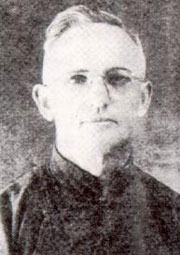
No. 13, Fall 2000
Loyal Bartel: Costly Faith in China
During the great Chinese Cultural Revolution of the late 1960s and early 1970s missionary Loyal Bartel became a target of the government authorities. Those were years of great turmoil and upheaval. Foreign persons, the educated, rich land owners, or other nationals who had previous connections with foreigners became targets of persecution, humiliation, imprisonment and even death. Loyal was not the only person suffering. But he was among the few Western foreigners still living in China.

One day in the late 1960s the authorities came to Loyal’s home in the village and cleaned out his books, letters, photo albums, magazines, and other printed materials. Most of the burnable items were piled in front of his house and set on fire. Reportedly one page from his Bible blew out of the flames. It contained Matthew 16:18: “Upon this rock I will build my church and the gates of hell shall not prevail against it.”
Loyal was born in 1901 just as his parents, Henry C. and Nellie (Schmidt) Bartel, arrived as missionaries in China. He died in China in 1971 as one of the few foreigners who remained following the establishment of the People’s Republic of China (the Communist government) in 1949. In the 1920s Loyal studied at Moody Bible Institute in Chicago and there he met and married Susan Schultz of Mountain Lake, Minnesota. Together they returned to China in the late 1920s. They spent most of the next two decades teaching and caring for the students at a Bible School in Tsao Hsien (later romanized as Caoxian).
Long before the 1960s Loyal and other members of the Bartel family encountered numerous difficulties in their efforts to witness to the Chinese people. Famine, war, impoverishment, and plagues are part of many missionary stories and so it was of the Bartel family. World War II brought a special set of trying circumstances for many foreigners caught in the territory that came under Japanese occupation. The occupying troops always feared that any foreigners were potential spies. Many missionaries, including Loyal, were held under house arrest during parts of the war. Loyal, on several occasions, faced stiff questioning by local Japanese commanders.
The difficulties faced prior to and during the war, however, paled with what was to come. The conclusion of the Second World War saw the resumption of the civil war between the Nationalist and Communist factions. It was increasingly unsafe for foreigners to remain in China, particularly women and children. Susan Bartel and the children – Lenora, Ruth, Lois, Esther and David – left in 1948, hoping that it would be possible to return following the cessation of hostilities. But with the victory of Communist faction and the establishment of the People’s Republic of China, virtually all foreigners were forced to leave. All other Mennonite missionaries were gone by 1952. Loyal chose to remain as a Chinese citizen.
The years following were long and difficult ones for all parties. Susan and the children first settled in Mountain Lake, and after the girls completed high school she moved to Wheaton, Illinois, where they attended college. Initially there was little communication between Loyal and the family. Eventually some minimal communication was established. Many times the family sought to persuade him to come to the United States or to visit family members in Japan. He always answered that he had no such leading at the time. Loyal was determined to stay and not leave the Chinese church.
He lived out the next twenty years on a small farm outside of Caoxian. During the winter months he had a coal stove in his room and often fellow villagers would come over to keep warm and to talk. Many had questions about his faith and about why he had decided to stay when his family was in America. He used these questions as opportunities to witness to his faith.
On at least two separate occasions Loyal was tried by mass courts. The procedure in these courts was to place the accused on a high platform before the people. After the charges were read the audience was given a chance to decide whether the individual was guilty or not. In such cases the crowd inevitably accepted the charges declared by the local authorities. In Loyal’s case, not a hand or voice was raised against him. It was very evident that he enjoyed the good will of the people.
Loyal’s decision to remain in China, at great cost to his family, is difficult for us to understand. Yet recent visitors to the Caoxian region report that the church, that has its roots in the work of the Bartel family, now numbers over 100,000 members. During 1998 two baptisms, at Easter and Christmas, added one thousand new members. It is a church that understands itself as growing from its Mennonite Brethren beginnings. The passage from the biblical page flying out of the fire remains as true today as when the Apostle Paul wrote it.
